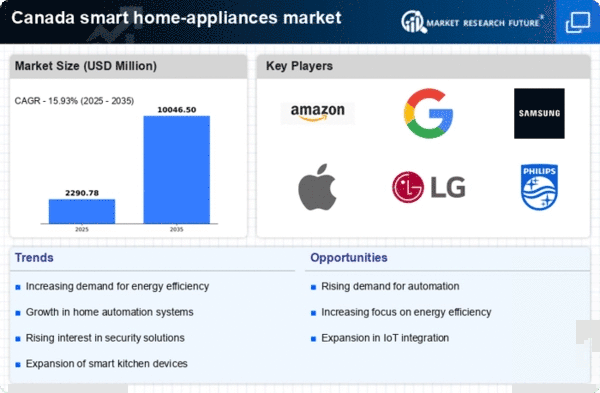Increased Focus on Home Automation
The trend towards home automation is significantly influencing the smart home-appliances market in Canada. Consumers are increasingly interested in creating interconnected environments that enhance convenience and security. The integration of smart appliances with home automation systems allows users to control various devices remotely, leading to a more streamlined living experience. Market data suggests that the home automation segment is expected to grow by over 15% annually, indicating a robust interest in smart technologies. This focus on automation is likely to drive the demand for smart home appliances, as consumers seek to simplify their daily routines.
Rising Urbanization and Population Growth
Urbanization in Canada is contributing to the expansion of the smart home-appliances market. As more individuals move to urban areas, the demand for efficient and space-saving appliances is increasing. Urban dwellers often seek solutions that enhance convenience and optimize living spaces, making smart appliances an attractive option. Statistics indicate that urban populations in Canada are projected to grow by approximately 2% annually, which may lead to a corresponding rise in the adoption of smart home technologies. This demographic shift is likely to create new opportunities for manufacturers and retailers in the smart home-appliances market.
Technological Advancements in Smart Appliances
The smart home-appliances market is being propelled by rapid technological advancements that enhance the functionality and appeal of smart devices. Innovations such as improved connectivity, artificial intelligence, and machine learning are enabling appliances to offer personalized experiences and greater automation. For example, smart refrigerators can now monitor food inventory and suggest recipes, while smart thermostats learn user preferences to optimize energy usage. As these technologies become more sophisticated, consumer interest is expected to rise, leading to increased sales in the smart home-appliances market. The integration of cutting-edge technology is likely to redefine consumer expectations and drive market dynamics.
Growing Consumer Awareness of Smart Technologies
The smart home-appliances market in Canada is experiencing a notable surge in consumer awareness regarding the benefits of smart technologies. As individuals become more informed about energy efficiency, convenience, and enhanced security features, the demand for smart appliances is likely to increase. Recent surveys indicate that approximately 65% of Canadian households are considering the adoption of smart home technologies, reflecting a shift in consumer preferences. This growing awareness is driving manufacturers to innovate and offer products that align with consumer expectations. Consequently, the smart home-appliances market is poised for growth as more Canadians seek to integrate these technologies into their daily lives.
Government Incentives for Energy-Efficient Appliances
In Canada, government initiatives aimed at promoting energy efficiency are significantly impacting the smart home-appliances market. Various programs offer financial incentives for consumers who purchase energy-efficient appliances, thereby encouraging the adoption of smart technologies. For instance, rebates and tax credits for energy-efficient products can reduce the overall cost for consumers, making smart appliances more accessible. This trend is expected to drive market growth, as consumers are more likely to invest in smart home technologies that not only enhance their living experience but also contribute to environmental sustainability. The smart home-appliances market is likely to benefit from these supportive policies.















